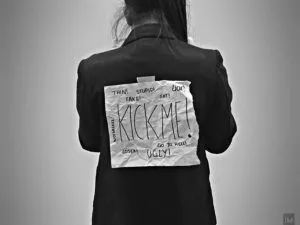
- Originally Published on September 16, 2024
What is the Legal Term for Public Humiliation? Laws, Definitions & Remedies
Imagine your most embarrassing moment being broadcast to the world without your consent. Sadly, this nightmare scenario is a reality for many victims of public humiliation. At Minc Law, we’ve seen the devastating impact malicious shaming can have on a person’s mental health, relationships, and career. While the internet makes it easier than ever to spread degrading content far and wide, the law does offer protections. In this article, we’ll explain the key legal terms, consequences, and remedies related to public humiliation.
What is Considered Public Humiliation Under the Law?
From a legal perspective, public humiliation refers to any publication or communication that subjects someone to severe ridicule, shame, and emotional distress in front of a wide audience. Some common forms of public humiliation include:
- “Doxing” – publicly revealing someone’s private information like their home address or phone number against their will
- Revenge porn – sharing sexually explicit images or videos of someone without their consent, often by an ex-partner
- Cancel campaigns – organizing social media mobs to bombard someone with hateful messages and pressure their employer to fire them over an offensive tweet or action
- Shaming websites – publishing mugshots, details of people’s criminal records, or embarrassing personal stories to ruin their reputation
- Misleading video clips – recording someone’s actions or words out of context and sharing only the most inflammatory portion online to falsely portray them in a humiliating light
Is Public Humiliation Illegal? What Laws Apply?
There is no single “public humiliation law” in the United States. Rather, this conduct can violate a number of different civil and criminal statutes depending on the state and circumstances:
- Defamation: Both libel (written) and slander (spoken) defamation laws punish the spread of false, damaging information about someone. Publicly accusing someone of having an STD or committing a crime, for example, could qualify if untrue.
- Harassment & cyberbullying laws: All states have laws against harassment, and most now have specific statutes aimed at harassing behavior online like cyberbullying and doxing. Encouraging others to threaten someone and sharing their personal information are common triggers.
- Invasion of privacy: “Public disclosure of private facts” is one of four main invasion of privacy torts. Publishing someone’s deeply personal information (sexual orientation, medical issues, etc.) in a humiliating way can violate their right to privacy.
- Intentional infliction of emotional distress: If the humiliation is so severe and outrageous that it causes the victim extreme emotional trauma, they may have an IIED claim even if the embarrassing information shared is technically true.
- Revenge Porn: Additionally, 48 states and DC now have specific “revenge porn” laws criminalizing the nonconsensual sharing of intimate/sexual images and videos. The federal government is also considering legislation to make revenge porn a nationwide crime.
What are the Legal Consequences of Publicly Humiliating Someone?
Perpetrators of online shaming and harassment can face both civil lawsuits by their victims and criminal prosecution under state &/or federal law. Potential consequences include:
- Restraining orders: Courts can issue orders prohibiting perpetrators from contacting victims or posting further humiliating content about them under threat of arrest.
- Monetary damages: Victims can sue for various damages caused by public humiliation, including reputation harm, lost income due to being fired, and pain & suffering from emotional distress.
- Injunctions to remove content: Judges can order websites, social media platforms, and search engines to delete any humiliating posts, images, or videos about the victim.
- Misdemeanor or felony charges: Conviction under criminal harassment, cyberbullying, and revenge porn laws can result in jail time in more egregious cases, especially if the perpetrator has prior offenses.
Even if victims don’t want to go through a full lawsuit, sending a cease-and-desist letter citing relevant harassment and privacy laws can often persuade perpetrators to stop and retract any damaging posts. An experienced defamation attorney can help victims explore all their options.
How Can I Take Legal Action if I’m a Victim of Public Humiliation?
If you are being targeted by malicious online shaming, it’s crucial to act quickly to minimize the damage and hold the perpetrator(s) accountable. Key steps include:
- Document everything: Take screenshots of all humiliating posts, comments, messages, images, and other evidence. Keep a diary of important dates, times, and witnesses.
- Report harassment to platforms: File formal complaints with any social media sites, forums, or websites where your harasser is posting abusive content. Most have policies prohibiting bullying.
- Consult an attorney: Reach out to a defamation lawyer who has specific experience with online harassment cases. They can assess the details and outline your legal options.
- Send a takedown notice: Demand in writing that your harasser stop posting humiliating content and instruct web platforms to remove existing posts. Your attorney can draft this.
- Contact law enforcement: If the shaming includes threats of violence, hacking of your accounts, or nonconsensual porn, file a police report as these often violate criminal laws.
- Pursue a civil lawsuit: Discuss the pros and cons with counsel to decide if it’s worth suing your harasser(s) for defamation, privacy violations, or emotional distress and seeking monetary damages.
The most important thing is to be proactive rather than suffering in silence due to shame or fear. You have the right to defend your reputation and pursue justice against harassers.
What Makes Public Humiliation So Harmful?
Public humiliation can inflict deep psychological wounds that linger long after the actual shaming incident. Victims often experience intense feelings of anxiety, depression, shame, and isolation. Some common emotional impacts include:
- Diminished self-esteem and confidence
- Trust issues in relationships
- Social withdrawal and agoraphobia
- Panic attacks and flashbacks (PTSD)
- Eating disorders and self-harm
- Suicidal thoughts and attempts
Moreover, Google and social media have a permanence that means humiliating content posted about someone may be visible to anyone who searches their name for years to come. This “digital scarlet letter” effect can cost victims job opportunities, college admissions, housing, and personal relationships as more and more organizations conduct online background checks.
While in the past, a person might be able to move on from youthful indiscretions or rebuild their life after a public mistake, “cancel culture” means that one offensive tweet, photo, or video clip can now destroy someone’s entire future. The cruelty of being defined by your worst moment and denied a second chance can be utterly demoralizing.
At its core, public humiliation is an attack on human dignity.
Minc Law Can Help You Protect Your Reputation
No one deserves the dehumanizing trauma of public humiliation. In the digital age, where one unflattering photo or angry rant can spread to millions with a few clicks, it’s more important than ever to be proactive in defending your reputation and peace of mind.
If you are targeted by online harassment and shaming, you don’t have to accept it as normal or stay silent out of misplaced guilt. Perpetrators who hide behind screens and pseudonyms are still responsible for the real-world harm they inflict. Lawmakers are increasingly recognizing this, and you have rights.
At Minc Law, we’ve helped hundreds of clients from all backgrounds fight back against internet defamation and reclaim their lives. We understand how overwhelming public shame and betrayal can feel, and we’re here to listen without judgment.
If you’re ready to explore your options, contact us for a confidential consultation. Our experienced team can review your situation, identify any legal claims, and recommend the best path forward. You deserve to feel safe and respected both online and off.
You can contact our office at 216-373-7706, message one of our dedicated intake specialists for more information, or chat with one of our Chat representatives now.
Get Your Free Case Review
Fill out the form below, and our team will review your information to discuss the best options for your situation.
This page has been peer-reviewed, fact-checked, and edited by qualified attorneys to ensure substantive accuracy and coverage.



